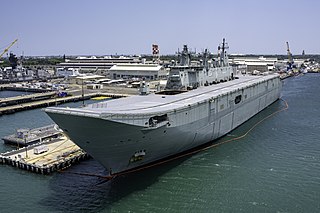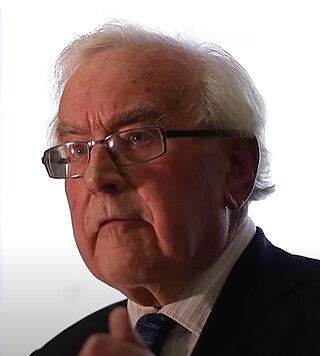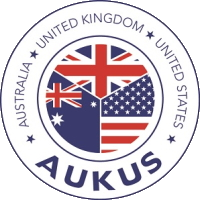Realpolitik is the approach of conducting diplomatic or political policies based primarily on considerations of given circumstances and factors, rather than strictly following explicit ideological notions or moral and ethical premises. In this respect, it shares aspects of its philosophical approach with those of realism and pragmatism. It is often simply referred to as pragmatism in politics, e.g. "pursuing pragmatic policies" or "realistic policies".

The Australian Defence Force (ADF) is the military organisation responsible for the defence of the Commonwealth of Australia and its national interests. It has three branches: the Royal Australian Navy (RAN), Australian Army and the Royal Australian Air Force (RAAF). The ADF has a strength of just over 90,000 personnel and is supported by the Department of Defence and several other civilian agencies.

Gregory Paul Sheridan is an Australian foreign affairs journalist, author and commentator. He has written a number of books on politics, religion and international affairs and has been the foreign editor of The Australian newspaper since 1992. He is a regular commentator on Australian television and radio, including for the ABC and Sky News Australia. The ABC describes Sheridan as "one of Australia's most respected and influential analysts of domestic and international politics."
The Defence Strategic Policy and Intelligence Group (SP&I) of the Australian Government Department of Defence is responsible for defence diplomacy, strategic policy, international security, and military intelligence co-ordination and advice to the Prime Minister of Australia, Minister for Defence, Secretary of the Department of Defence, and Chief of the Defence Force. The Defence Strategic Policy and Intelligence Group is led by the Deputy Secretary for Strategic Policy and Intelligence and comprises three policy divisions and two intelligence agencies.

The Canberra class is a ship class of two landing helicopter dock (LHD) ships built for the Royal Australian Navy (RAN). Planning to upgrade the navy's amphibious fleet began in 2000, based on Australian experiences leading the International Force for East Timor peacekeeping operation. With a new climate for growing Australian Navy spending, a desire existed for forward defence capability for landing and supporting troops on Asian territory, that had never existed in Australian history, even with the old Majestic-class light fleet carriers, HMAS Melbourne and HMAS Sydney in the 1970s. In 2004, French company Direction des Constructions Navales (DCN) and Spanish company Navantia were invited to tender proposals, with DCN offering the Mistral-class amphibious assault ship and Navantia proposing the "Buque de Proyección Estratégica" design. The Spanish design was selected in 2007, with Navantia responsible for construction of the ships from the keel to the flight deck, and BAE Systems Australia handling the fabrication of the combat and communications systems. Finally, Siemens (Germany) supplied and fitted the azimuth thrusters.

David Ian Feeney is a former Australian politician. He was the Labor member for the division of Batman in the House of Representatives from 7 September 2013 to 1 February 2018. Before that, he was a member of the Australian Senate for Victoria from 2008 until his resignation to contest Batman. Feeney resigned as a member of Parliament on 1 February 2018 as he was unable to produce any documentary evidence disproving he was a dual citizen, which is a breach of section 44 of the Constitution of Australia.
Defence Australia is a department of the Government of Australia charged with the responsibility to defend Australia and its national interests. Along with the Australian Defence Force (ADF), it forms part of the Australian Defence Organisation (ADO) and is accountable to the Commonwealth Parliament, on behalf of the Australian people, for the efficiency and effectiveness with which it carries out the Government's defence policy.

The Australian Strategic Policy Institute (ASPI) is a defence and strategic policy think tank based in Canberra, Australian Capital Territory, founded by the Australian government, and funded by the Australian Department of Defence along with overseas governments, and defence and technology companies.
Robert John O'Neill, was an Australian historian and academic. He served as the chair of the International Academic Advisory Committee at the United States Studies Centre at the University of Sydney, was director of the International Institute for Strategic Studies, based in London, from 1982 to 1987, and Chichele Professor of the History of War at the University of Oxford from 1987 to 2000.

David John Kilcullen FRGS is an Australian author, strategist, and counterinsurgency expert who is currently the non-executive chairman of Caerus Associates, a strategy and design consulting firm that he founded. He is a professor at Arizona State University and at University of New South Wales, Canberra.

John Sitilides is a Washington, D.C. geopolitical strategist and diplomacy consultant to the U.S. Department of State.
Laurent Murawiec was a French neoconservative figure, member of the Hudson Institute and of the Committee on the Present Danger, and formerly defence analyst at the RAND corporation. Murawiec was an associate of Lyndon LaRouche from 1973 to 1986, and wrote for Larouche's Executive Intelligence Review in the 1980s.

Defending Australia in the Asia Pacific Century: Force 2030 is an Australian Government white paper released on 2 May 2009. The publication seeks to provide guidance for Australia's defence policy and the Australian Defence Force (ADF) during the period 2009–2030.

Alan Anthony Dupont is an Australian international security expert, Defence and National Security Advocate for the Northern Territory and company director who has been the CEO of geopolitical risk consultancy the Cognoscenti Group since 2016. He is also contributing national security editor for The Australian newspaper, adjunct professor at the University of New South Wales (UNSW), a non-resident senior fellow at the Atlantic Council in Washington, and the Lowy Institute in Sydney and a fellow at the Hinrich Foundation.
Security in the South Pacific has proved to be one of the most enduring of Australia's security concerns. It was the subject of Australia's first substantial strategic policy initiative, when in 1888 Alfred Deakin took his concerns about French intrusion into Vanuatu to London. Since then, the South Pacific has played an important role in Australian security thinking. Notably during the Second World War in the Pacific and through Australia's responsibilities as a colonial power in Papua New Guinea until that country's independence in 1975. Australia was regarded as having been quite detached from the Pacific Islands during the post colonial period. However this period, until the beginning of the 21st century, was marked by numerous small scale Australian Defence Force (ADF) operations in the region. The notable cases were in Vanuatu in 1980 and 1988 as well Fiji in 1987. The ADF also played an important role in peacekeeping missions in Bougainville during this period.
Major General Peter John Abigail, is a retired Australian Army officer who held a number of senior commands, including Deputy Chief of Army (1998–2000) and Land Commander Australia (2000–2002). Following his retirement from the army, Abigail served as the Executive Director of the Australian Strategic Policy Institute from 2005 until 2011. He also served as a member of the three-person Ministerial Advisory Panel for the 2009 Defence White Paper.

Paul Dibb AM is an English-born Australian strategist, academic and former defence intelligence official. He is currently emeritus professor of strategic studies at the Strategic and Defence Studies Centre that is part of the Australian National University.

The 2016 Defence White Paper is a white paper published by the Australian Department of Defence outlining a strategic plan for the Australian Defence Force (ADF) over the following decade. The paper describes the need for improvement in the capabilities of the ADF, and includes a commitment to A$195 billion in spending on new equipment and resources, as well as plans for restructure and review of the Royal Australian Navy, the Royal Australian Air Force and the Australian Army.

Rex Lyall Patrick is an Australian politician who served as a Senator for South Australia from November 2017 until June 2022. He was appointed to the Senate to fill a casual vacancy caused by the resignation of Nick Xenophon. He joined the Senate as member of the Centre Alliance party, though in August 2020 he left the party and became an independent. He created the Rex Patrick Team party in January 2021 and sat in parliament as its only member for the duration of his term. Before entering politics, Patrick was a businessman and senior business executive officer, as well as a submariner in the Royal Australian Navy.

AUKUS, also styled as Aukus, is a trilateral security pact between Australia, the United Kingdom, and the United States, announced on 15 September 2021 for the Indo-Pacific region. Under the pact, the US and the UK will assist Australia in acquiring nuclear-powered submarines.












